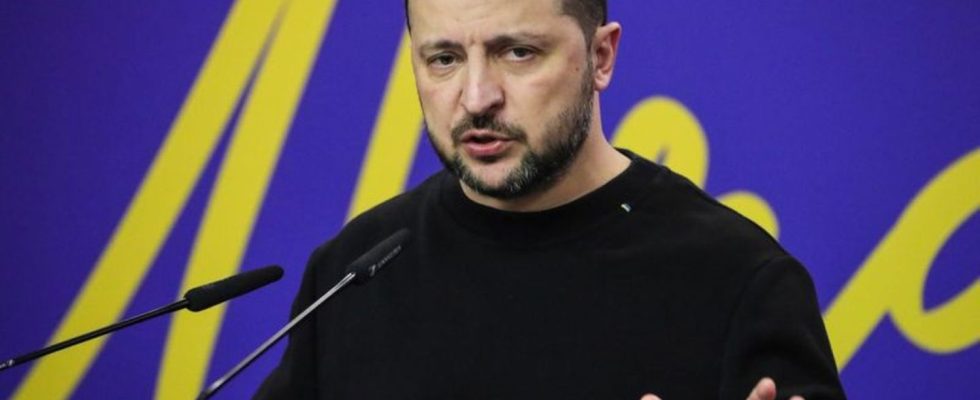There are no presidential elections in Ukraine because of martial law. That is why there are debates about the legitimacy of President Zelensky. Opponents in Kiev and Moscow are particularly looking at one date.
Ukrainian President Volodymyr Zelensky still has fond memories of May 20, five years ago, as the youngest head of state in the country’s history. He promised the Ukrainians peace when he was inaugurated after a record election result.
“I am prepared without hesitation to lose my popularity and even my office just so that peace can come,” he said. Instead, the 46-year-old has been fighting against the Russian war of aggression for more than two years. Martial law not only thwarted plans for the presidential election on March 31st. It also leaves Zelensky’s powers, which are due to expire on May 20, still in effect.
Despite this essentially clear situation, a debate is now raging around the date. The fact that Zelensky will remain in power beyond that day and then start his sixth year in office “creates an unexpected problem for Ukrainian democracy,” says expert Konstantin Skorkin from the Carnegie think tank. Unlike its neighbors Russia and Belarus, Ukraine is proud of its tradition of free elections. The slightest doubt that this achievement could be scratched caused “shock waves” in Ukrainian society and the elite.
Opponents in Kiev and especially in Russia, which began its war of aggression against Ukraine on February 24, 2022, are currently openly questioning Zelensky’s legitimacy. The president and his apparatus have made it clear, citing the constitution, that martial law guarantees the continuation of official business and powers in full. But the debate about it refuses to die down.
Perhaps after May 20 there will no longer be any reason to worry about Zelensky’s powers, Russian Foreign Minister Sergei Lavrov said in an interview at the end of March. Russian UN Ambassador Vasily Nebenzya was clearer, saying that Zelensky would then no longer be legitimately in office because he had decided on his own initiative to cancel the presidential election. According to the constitution, the election should have been scheduled for the last Sunday in March in the fifth year of office.
Warning about Russian disinformation campaign
At the end of February, Ukrainian military intelligence issued a warning that Russia would launch a disinformation campaign about Zelensky’s legitimacy after May 20 between March and May. “The enemy’s plan envisages that in the first half of June the situation in our country will be shaken and then, taking advantage of the situation, Ukraine will be defeated militarily in the east,” the agency said. The secret service claimed that Moscow had provided the equivalent of almost 1.4 billion euros for the plan called “Maidan 3”. This is the most expensive operation by the Russian secret services in history. The secret service did not provide any evidence.
But it is not only Russian propaganda that wants to weaken Zelenskyj’s authority on the international stage with such debates in the conflict, which is also an information war. They have also long been the subject of internal political trench warfare within the country itself.
The camp surrounding Zelensky’s opponent Petro Poroshenko, who wants to run again in the next election after his defeat in 2019, is questioning the support for the president, as are the former actor’s former companions. Former parliamentary leader Dmytro Razumkov, who led Zelensky’s election campaign and also the Servant of the People party, said in a video blog entry that the president would have to give up his powers after May 20th. Although only the Constitutional Court can give a final answer to the question, Zelensky is ducking it.
Crumbling support in parliament and the threat of ungovernability
“This creates insecurity inside the country and abroad,” warned Razumkov. War enemy Russia in particular will take advantage of this. Another MP, former Zelensky acolyte Olexander Dubinsky, who is in custody on charges of high treason, made a similar statement. Only parliament, the Supreme Rada, is legitimate, he said.
But support in parliament for Zelensky continues to crumble. Formally, his group still has 235 MPs out of 254. But in fact only 170-180 of the MPs take part in the votes; The president and government rely on votes from other factions or groups. According to Zelensky’s parliamentary group leader David Arachamija, of the remaining 401 parliamentarians, at least 17 want to give up their mandate from the presidential party alone. Experts expect that the search for parliamentary votes, which is already not easy, will become even more difficult after May 20th. There could be a form of ungovernability.
According to experts, Zelensky is preparing for a possible loss of power, as shown by the recent dismissals of companions and the appointment of tame followers. Zelensky is arming himself for the more difficult foreign and domestic policy situation by restructuring his apparatus, said Carnegie expert Skorkin.
According to observers, the head of the presidential administration, Andrji Jermak, who has long been considered a kind of secretive president, will be strengthened. It is said that Yermak’s people have taken the place of the dismissed Secretary of the Security Council, Oleksiy Danilov, and Zelensky’s advisor Serhiy Shefir.
Declining support among the population
Surveys by opinion research institutes continue to show support among the population for Zelenskyj’s decisions, but support is noticeably declining. “Of course, the accusations of Zelensky’s illegitimacy by themselves will not worry ordinary Ukrainians,” says Skorkin, “but if these are accompanied by serious military and social problems, then they can become more serious.”

